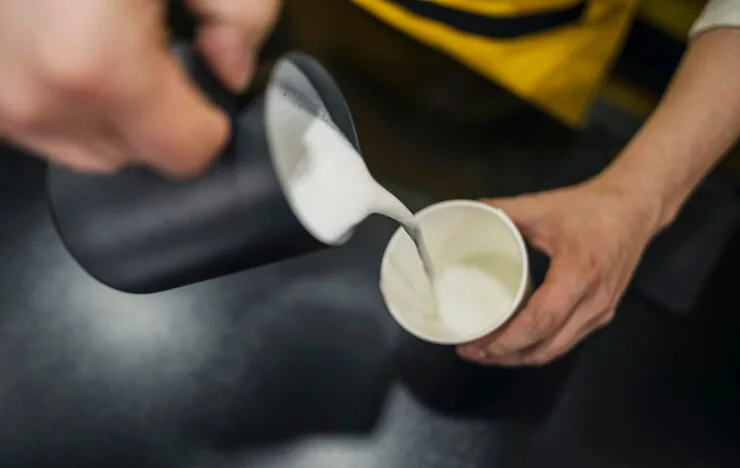Imagine the scene
The backpack is ready, the playlist loaded, the mental hype is through the roof.
You’re standing in front of the fridge, you open it, grab that cold bottle of whole milk…
And down it goes in one shot, like it’s some kind of muscle-building magic potion.
You saw it in a video, read it on Reddit, and maybe your super-jacked buddy swears he’s been doing it for years.
But… does it really work?
Does drinking milk before a workout actually make your muscles grow faster?
Or is it just another locker room urban legend?
Spoiler: there’s a bit of truth, but also a lot of confusion.
The myth of pre-workout milk

It’s not a new idea.
Milk has always been a loyal ally of bodybuilders, since the golden age of the ’70s.
Back in Arnold’s day, there was even talk of “GOMAD”: a gallon of milk a day.
Some people literally drank it at breakfast, lunch, dinner, and snacks, like it was a natural liquid protein shake.
So of course, over time, someone thought:
“If milk helps you grow… maybe drinking it right before training speeds things up!”
Well, it’s not that simple.
There’s a big difference between feeding muscles in the long term and fueling a workout in the moment.
What’s really in milk that’s good for muscles?

Milk is a nutrient bomb.
- Protein: contains both fast-absorbing whey and slow-release casein
- Carbs: in the form of lactose
- Fats: if we’re talking about whole milk
- Electrolytes and vitamins: calcium, potassium, phosphorus, vitamin D, B12… the full package
In short, it’s a complete food.
But… here comes the crucial point…
Milk is not an instant fuel for your workout.
Your body takes time to digest it.
Even the “fast” part (whey) starts working only after 20–30 minutes.
Casein? It can take 6–7 hours.
So if you planned on chugging milk and diving into your 5×5, you might end up fighting cramps instead of the barbell.
Drinking milk right before training: pros and cons
Cons, right off the bat:
- Feeling bloated and heavy
- Potential digestive issues (especially if you’re lactose-sensitive)
- Slower performance (if you’re doing high-intensity training)
Pros, but with conditions:
- If you train on a completely empty stomach, it might help prevent an energy crash
- If you don’t have other food or supplements handy, it’s still a decent protein intake
But let’s be real:
There are much better pre-workout options.
A banana and protein powder shake?
Way better.
Gives you quick energy without weighing you down.
Does milk still help build muscle mass?
Absolutely.
But not because you drink it before working out.
It helps because:
- It gives you complete protein
- It helps you meet your daily calorie needs
- It supports recovery and growth in the medium to long term
So if your goal is to gain size, milk can definitely help.
But see it as a consistent tool, not a “magic trick” before training.
Bulking strategies: where milk fits in
Here’s where milk plays dirty—in a good way.
When you’re trying to bulk up, you need:
- Calories
- Protein
- Food you can get down even when you’re not hungry
And milk hits all three.
It’s no coincidence that many “hardgainers” use it as a base for shakes.
Short on time?
Don’t feel like cooking?
A big glass of milk with oats, peanut butter, and whey… boom—700-calorie shake in two gulps.
When to drink milk to maximize benefits |
|
|---|---|
| When | Why |
| Post-workout | Great idea. Your body is hungry for protein and carbs. Milk gives you both. |
| Before bed | Perfect. Casein releases amino acids slowly overnight. |
| During the day | As a snack, to curb hunger or add extra calories. |
Personal experience: yep, I tried it
Oh yeah.
I went through my “milk-before-gym = instant gains” phase.
One time I drank a big glass of whole milk 10 minutes before leg day.
Never again.
My stomach felt like a washing machine on spin cycle.
Every lunge was a prayer that disaster wouldn’t strike.
Moral of the story?
Milk is great, but timing matters.
Drinking milk right before your workout… is like running with a backpack full of water. It’s possible, but why make things harder?
So… does it actually speed up muscle growth?
Only if it contributes to your overall daily protein and calorie intake.
It’s not about timing.
You can drink milk at breakfast, lunch, post-workout, or before bed.
What matters is that it fits logically into your nutrition plan.
What type of milk to choose for building muscle?
Not all milk is the same.
- Whole milk: more calories and fat, great for bulking
- 2% milk: less fat, still decent protein content
- Skim milk: fewer calories, but also less satiety
- Plant-based milk (soy, oat, almond): be careful, most have much less protein than cow’s milk—except soy, which has a decent protein profile
The tip?
If you want to gain size and have no intolerance issues, whole milk is still the most effective.
But also factor in your calorie preferences.
Milk and digestion: tricks to avoid problems before workouts
If you’re someone who gets bloated just looking at milk, you’re not alone.
Practical tips:
- Try lactose-free milk: often easier to digest even if you’re not officially intolerant
- Drink it warm or room temperature: can aid digestion
- Don’t pair it with fiber or heavy foods pre-workout: better on its own or in a simple shake.
Can milk replace a post-workout protein shake?
In many cases, yes.
A 250 ml glass of cow’s milk gives you:
- About 8g of protein
- 10–12g of carbs
- Varying fats (0 to 8g depending on type)
If you add a banana or a scoop of protein powder, you’ve got a complete post-workout shake without pricey supplements.
What do studies say? Milk vs other protein sources
A study in the American Journal of Clinical Nutrition compared milk with soy or carb-based drinks post-workout. (Milk for Muscle Recovery: What Makes It So Effective?
Result?
Milk led to greater muscle protein synthesis, thanks to its combo of leucine, calcium, and post-meal insulin spike.
Other studies show milk is especially effective for promoting muscle anabolism if consumed within 1 hour after training.
How to fit milk into a hypertrophy nutrition routine
Sample day:
- Breakfast: whole milk + oatmeal + peanut butter
- Post-workout snack: milk + banana + protein powder
- Pre-bed: a glass of milk + a square of dark chocolate
This gives you steady protein, quick energy, and nighttime protein synthesis support.
Does milk really slow down metabolism during workouts?
Some fear that drinking milk pre-workout “slows down” metabolism.
In reality, it’s not milk itself, but the digestive response that might affect performance.
The body, if busy digesting something complex like milk (especially whole milk), may divert energy to the stomach instead of the muscles.
Result? Less sharpness, more sluggishness in the early workout phase.
It’s not about your metabolism “stopping”—just a shift in internal energy priorities.
What happens if you mix milk and caffeine pre-workout?
Weird combo?
Not really.
Many natural pre-workouts include caffeine (coffee, tea, guarana), and some people drink it with milk.
But heads-up: milk can slightly slow caffeine absorption.
If you want a fast energy spike, go for a straight espresso.
If you prefer a steadier boost, a coffee with a splash of milk might give you smoother energy with less caffeine anxiety.
How much milk is too much for a muscle-building diet?
Milk has benefits, yes… but overdoing it can lead to:
- Excess “liquid” calories
- Imbalanced fat intake (too much saturated fat)
- Possible interference with iron or zinc absorption if overconsumed daily
Ideal intake depends on:
- Your goal (bulking, cutting, maintenance)
- Digestive comfort
- Daily calorie needs
Balanced average?
250–500 ml per day, spread across 1 or 2 strategic moments.
Milk and water retention: myth or reality?
Many avoid milk fearing water retention.
In reality, it’s not milk—it’s a mix of factors:
- Too much sodium
- Dehydration
- Poor training habits
Milk does have sodium, yes—but also potassium, which balances it out.
Unless you’re prepping for a bodybuilding show or photoshoot, milk-related retention is minor and temporary.
Can milk help immune recovery after intense training?
Tough workouts also stress your immune system.
Thanks to its glutamine, vitamin B12, and zinc, milk can give your recovery a small boost.
Plus, the bioactive peptides in milk proteins may have anti-inflammatory and immune-supporting effects, according to some studies.
Not a medicine, sure—but as part of a complete diet, it’s an extra helper.
RELATED:》》》 Does drinking olive oil for calories actually help skinny guys bulk faster?
Conclusion
Milk can be a powerful part of your muscle-building plan.
But it’s not a magic bullet to chug “on the fly” before hitting the bench.
Want to grow?
- Focus on overall nutrition
- Choose the right time for every food
- Listen to your body—not just the forums
Milk works.
But only if used properly.
And especially, if it doesn’t send you sprinting to the bathroom in the middle of push-ups.
I’m curious—do you actually use milk in your routine, or does it wreck you halfway through push day?
Let me know in the comments.

